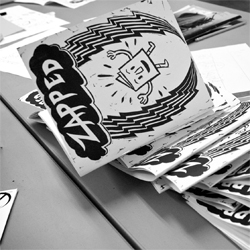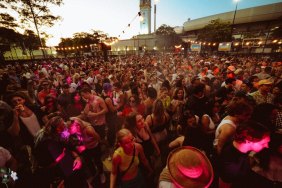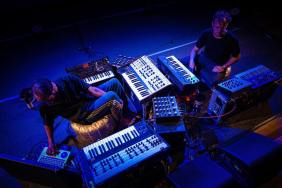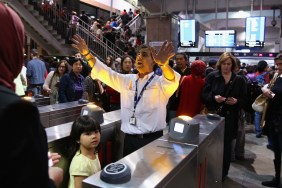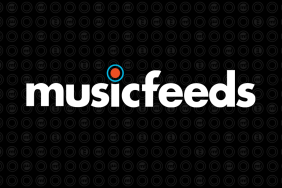Late. Night. Library. Do those three words even make sense together? And when did libraries get cool?
And no, it’s not just some ironic hipster thing. Upstairs, every Thursday night at Surry Hills Library, a bunch of seriously smart thinkers and doers get together for a free late night, adult-only event of storytelling, live readings and performances and, naturally, wine and cheese. Previous nights have featured media geek Marieke Hardy reading her teen diaries, a top secret preview of the Sydney Film Festival, and LGBTI erotic fan fiction readings.
This month, the shadowy Campfire Collective (a Sydney boutique arts producing crew) have seized the reigns to guest curate a season of Late Night Library. We chatted about this week’s instalment, Critical Inking, which will feature a veritable intellectual feast of DIY zinesters, printers, guillotiners (and live music-makers) including Blood and Thunder publishing, and New Planes Public Press and their Mobile Book Cart.
MF: What can we expect from the next Campfire Collective-curated Late Night Library evening, Critical Inking?
CC: The idea for this evening really just came out of us not knowing a whole lot about indie printing, and finding out more for ourselves, and how exciting that was. We met some interesting people and found out more about the processes in zine making and handmade printing, and wanted to have a whole night dedicated to the stories, the artists, their tools, and the fruits of their labours.
The Campfire crew have been involved in a whole bunch of very intelligent, switched-on indie art/culture initiatives, like Imperial Panda Festival, Storytelling at Performance Space and the special FBi Radio All the Best broadcast from Sydney Writer’s Festival. Your latest project is curating this season of Surry Hills Late Night Library. What was your general approach to curating this gig?
CC: Yeah, we’ve been really lucky to be involved with things like P Space, Panda and All The Best. We’re proud, and thankful. So of course we were super chuffed at the chance to curate Late Night Library for a month, because we love the building and the gigs that have been coming out of LNL under Eddie Sharp. And it’s awesome that the whole thing even exists as a City of Sydney initiative, and that the City’s own arts staff have entrusted the arts community to deliver curation; and it’s paid off.
Our approach with Campfire Collective’s program was to try to present events we thought were timely, wanted, cohesive but not totally prescriptive, and I hate to use this word, but fun. And also to forget that it’s a Library. It’s just a venue with a crowd like any show, that are up for some things, and not others. I think you could have a bingo night in there and it’d fit.
MF: Campfire Collective is a “boutique arts producer”. Break it down – what does that mean?!
CC: OK, breaking it dooooown (noise of record scratching and slowing to a halt). By boutique, we mean small and specialised. We’ve said that we’re a small arts producer, like a small bar; we’re not big or flash, and there may be milk-crates involved, but you’ll have a good time. By arts, we mean pretty broadly anything in the realm of artistic practice, though in our first year we’ve mostly worked in performing arts. And by producer, we mean that we’re the doer, and usually risk-bearer. As producers, we mostly just facilitate, but sometimes we adopt the traditional creative role of say a film type producer who is involved in the vision and ideas of a project. So, day to day that means we find small scale arts projects that are within our capacity, and make them happen.
MF: What do you attribute the mini explosion in DIY culture like self-publishing to?
CC: I think that in the way that blogs, Facebook, and Twitter have allowed an outlet for people who previously wouldn’t have had a voice in the media, zines provide the same thing: access. Many zine artists, writers, makers would never see their work published in a mainstream publication that’s rolling off a mega printing press, so they can go out and do it themselves with zines. I think that stories that have a ring of truth and honesty to them are always more attractive, and zines go through fewer filters, so they certainly feel more real, down to earth.
MF: What do you see as the biggest issues confronting creative thinkers and makers in Sydney at the moment? Increasing expense of studio spaces, rent and so on?
CC: If I was an artist working in need of space, then undoubtedly it’s an issue. Sydney’s commercial development and real estate driven culture naturally plays to those with money to pay for their space, money not often available to artists. Innovation will protect a lot of damage, for sure. Projects like Renew Newcastle and the Pop Up Parramatta project it inspired, gives unused commercial space to artists for a short lease.
I’m not really skilled enough to weigh in, but one issue I think that is always important is audience development. Art is timeless but the more noise that ends up in the media landscape the harder and harder it will become to break through. So I do think it’s important for artists, institutions and governments to build the next generations of art audiences, and strengthen the current ones. And, who knows; then maybe artists would have more dollars to pay for their space.
MF: Do you see the independent arts community in Sydney adopting an overly commercial or PR cast?
CC: I see a trend toward commercialisation, but no more in the indie arts community than in anything else, though I can see how that does give the appearance of a ‘scene’, because it just loses that little element of quality, or honesty. But there is still definitely a thriving community and I don’t believe that’s being overtaken. Any good independent thing will always strive to retain independence, while commercial interests want to get a piece of the action. Like when independent film was truly independent, and eventually most of the independent studios became subsidiaries of the majors. I don’t think that they’re necessarily mutually exclusive though, if it’s looked at more specifically than just Big Business v Art, and that the arts community can work with commercial interests to help support their goals whilst maintaining strong independence, then I’m all for that.
MF: Which independent Sydney artists/musos/creative freaks inspire you and the work of Campfire Collective?
CC: Some of the people we really like are Cody Dillon, Applespiel, sometime Sydneysider Virginia Gay, post, Kate Worsley, Drew Fairley, Eddie Sharp and everyone at Imperial Panda, post, Brown Council; Eliza, Jesse and Brigitte from FBi’s All The Best, and many many more at any given time.
The Campfire Collective is curating this week’s Late Night Library event, Critical Inking.
Thursday 25th August, 9pm
Surry Hills Library
405 Crown St
Surry Hills NSW 2010
It’s free, and to répondez s’il vous plaît, call Surry Hills Library on 02 8374 6250. (And yes, these events pack out, so get onto it now.)
(Pic: Michael Chamberlin performs at Late Night Library, Surry Hills)

